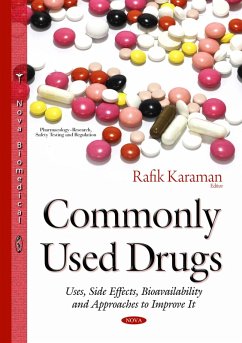
Sunitinib: Mechanisms, Interactions and Side Effects (eBook, PDF)
Versandkostenfrei!
Sofort per Download lieferbar
102,95 €
inkl. MwSt.

PAYBACK Punkte
51 °P sammeln!
Tyrosine kinase inhibitors are used to treat patients with advanced thyroid cancers. Sunitinib (SU11248) is an oral small-molecule, oxindol derivative, multi-targeted tyrosine kinase inhibitor that inhibits receptors for platelet-derived growth factor and vascular endothelial growth factor receptors, growth factor receptor, fms-related tyrosine kinase 3, RET oncogene and a multitargeted tyrosine-kinases. In Sunitinib: Mechanisms, Interactions and Side Effects, the authors report nine open-label studies carried out with sunitinb wherein the drug showed its anti-tumoral activity in advanced diff...
Tyrosine kinase inhibitors are used to treat patients with advanced thyroid cancers. Sunitinib (SU11248) is an oral small-molecule, oxindol derivative, multi-targeted tyrosine kinase inhibitor that inhibits receptors for platelet-derived growth factor and vascular endothelial growth factor receptors, growth factor receptor, fms-related tyrosine kinase 3, RET oncogene and a multitargeted tyrosine-kinases. In Sunitinib: Mechanisms, Interactions and Side Effects, the authors report nine open-label studies carried out with sunitinb wherein the drug showed its anti-tumoral activity in advanced differentiated thyroid carcinoma, advanced tumors refractory to radioiodine and in medullary thyroid carcinoma, in phase II trials and in retrospective studies. The aim of the following chapter is to summarize the published results of clinical research focused on the use of sunitinib in pediatric oncology and to supplement it with the experience from the authors' clinical practice. Suggestions appearing in case reports and clinical trials indicate that sunitinib may be a valuable drug also in pediatric clinical oncology. More attention should be paid to the selection of the most suitable indications, patients, and doses to balance the efficacy and safety in children with malignant diseases. The concluding review offers a comprehensive overview of phases I and II studies investigating clinical efficacy, tolerability and safety of sunitinib for the treatment of ovarian cancer (OC). Sunitinib was tested in OC due to increasing incidences of resistance to chemotherapy in diseases which have a poor prognosis. Further trials are required to better understand the efficacy of this drug. Regarding its safety-profile, hematologic and non-hematological adverse events are common, but generally not clinically significant.
Dieser Download kann aus rechtlichen Gründen nur mit Rechnungsadresse in A, B, BG, CY, CZ, D, DK, EW, E, FIN, F, GR, HR, H, IRL, I, LT, L, LR, M, NL, PL, P, R, S, SLO, SK ausgeliefert werden.













